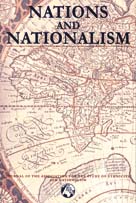Article contents
The artist as nation-builder: William Butler Yeats and Chaim Nachman Bialik
Published online by Cambridge University Press: 01 October 1999
Abstract
The poets William Butler Yeats (1865–1939) and Chaim Nachman Bialik (1873–1934) were among the builders of their respective Irish and Jewish national cultures. Their lives and careers were in limited ways remarkably alike and throw light on the dynamics of cultural nationalism. Each emerged in an historical watershed, leading to the establishment of an Irish state in 1921 and a Jewish state in 1948. Though their circumstances, styles, receptions and fates differed, each represented a profound moral vision in an age of declining faith, expressed his people's sense of victimisation and exposed their weaknesses as he saw them. Each saw his culture as being humanist and universal, not narrowly nationalistic. Each identified with his nation for reasons that were in part intensely and disturbingly personal. Each found a poetic voice in a rich heritage of ethnic myth, legend and symbol but was conscious of tension between the need for self-expression and national demands. It is argued that the creative powers of both Yeats and Bialik were set free by the national movements of which they were a part, and that the national struggle for self-determination was, in effect, mirrored on the private scale by the poet striving for artistic freedom and originality.
- Type
- Research Article
- Information
- Copyright
- © 1999 Association for the Study of Ethnicity and Nationalism
- 8
- Cited by




